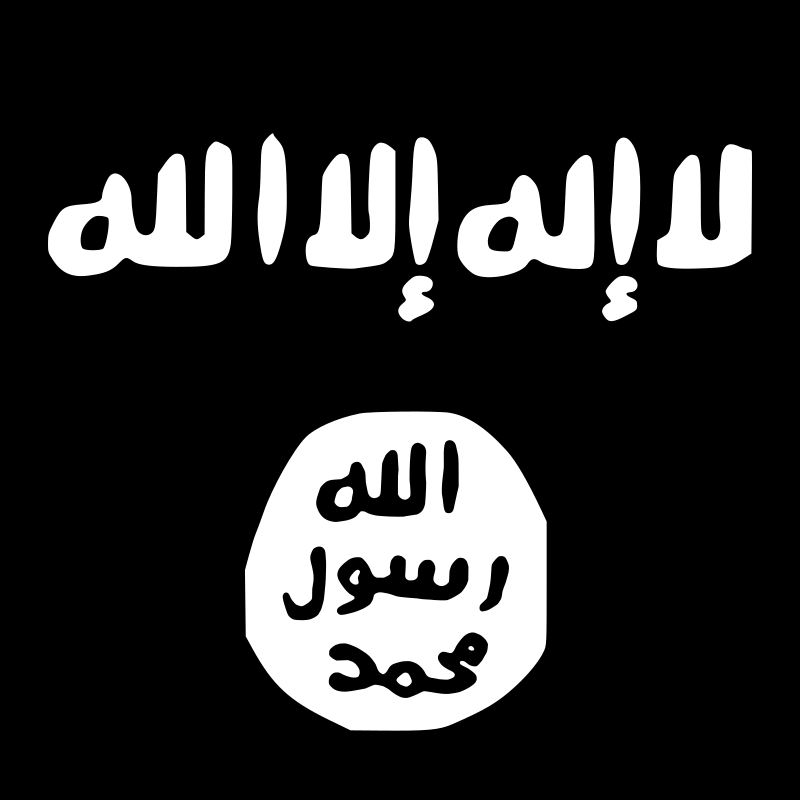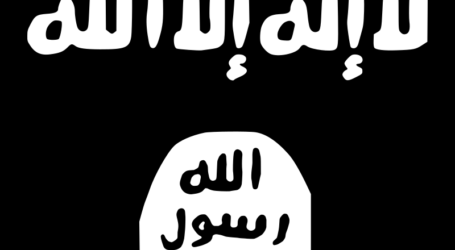Opposition to Abu Bakr al-Baghdadi: The Testimony of a Former Amn
Last month’s al-Furqan Media video in which Islamic State (IS) leader Abu Bakr al-Baghdadi made his first visual appearance since 2014 was partly designed to reassure IS supporters that their caliph was still alive and that he was still very much in control of the organization, being well aware of all developments pertaining to it.
However, Baghdadi’s appearance has not won over those of the ‘moderate dissident’ trend that had long been critical of what it saw as excessive extremist influence in the organization. Previously, the ‘moderate dissident’ trend primarily focused on providing nasiha (‘advice’) on how to reform IS from within, and arguably was willing to give Baghdadi the benefit of the doubt, in that he was portrayed as a distant and absent figure who had allowed the extremists to gain too much influence. In this portrait, Baghdadi is a leader at fault, but he is not necessarily seen as malicious or conniving with the extremists.
However, this trend’s view of Baghdadi has only soured following the complete collapse of IS’ state project in Iraq and Syria and previous reports of the killing of the remaining figures in IS upheld by the ‘moderate dissident’ trend (e.g. Abu Ya’qub al-Maqdisi). Indeed, the ‘moderate dissident’ trend has increasingly taken on a stance of opposition to Baghdadi himself. That is, rather than the problem being one of some extremist individuals or an extremist faction within the group, the entire system Baghdadi leads is considered to be rotten, with Baghdadi derisively referred to as “Ibn Awad.”
The lengthiest exposition of this ‘moderate dissident’ opposition to Baghdadi so far has been the work of Abu Muhammad al-Hashimi, who, while still based in IS territory in eastern Syria, wrote a work in summer 2017 entitled “Hashimi Advice” addressed to Baghdadi. Even at that time, the work’s tone was very scathing. Hashimi subsequently fled and became wanted by IS. More recently, just before the fall of Baghuz in eastern Syria to the U.S.-backed Syrian Democratic Forces, he published a lengthy work with a forward by Khabab al-Jazrawi urging for IS members throughout the world to revolt against Baghdadi and his leadership.
Recent works put out under the imprint of the main ‘moderate dissident’ outlets- al-Turath al-Ilmi, al-Wafa’ and al-Ma’arij- are also assuming the opposition to Baghdadi stance. An example is this essay published on 19 May 2019 by al-Wafa’ Media, written by a former amni (member of the security apparatus) of IS calling himself Abu Muslim al-Iraqi. This amni describes himself as a ‘repenting’ person asking for God’s forgiveness and heeding the call of Abu Eisa al-Masri (one of the ‘moderate dissident’ luminaries who managed to flee IS territory) for those who have testimonies to publish exposés on the ‘Baghdadi regime.’
In publishing his testimony, Abu Muslim highlights that what he documents is based as far as possible on his own experiences as an amni in Iraq. In contrast, he admits that his knowledge of what occurred in Syria is limited. He also notes that some of what he recounts is based on stories he says have been corroborated by multiple sources (in particular regarding what he writes about the battle of Mosul in 2016-2017). Abu Muslim affirms that his point is not to draw attention to mistakes that can be put down to flawed individuals but problematic policies of the group as a whole. In sum, his main points are:
(i) The policy of dealing with people who declared repentance amounted to breaking pacts and covenants, as officers from the Iraqi security forces and provincial council members who declared repentance were subsequently arrested and liquidated anyway. Further, IS made additional requirements that policemen who had repented should hand over a Glock pistol or a $2000 sum, imprisoning those who did not do so. Note that the testimony on demanding policemen hand over a Glock pistol or pay a sum of money partially matches reports from previous years about demands of money for true acceptance of repentance.
(ii) Protection was granted to Yezidis who converted to Islam (which would mean that their women would not be taken as sabaya). But a perceived need for sabaya after an increase in prices and fleeing of many sabaya led to Hajji Mu’atazz (Abu Muslim al-Turkmani) striking an arrangement with some local officials to seize for themselves some girls from a Yezidi family that had converted to Islam. Those involved in this criminal act were not held to account in court since the order came from Hajji Mu’atazz, who was Baghdadi’s deputy for Iraq. The point is that Baghdadi’s deputies could act above the law.
(iii) Killing Muslim civilians who tried to flee Mosul amid the siege and intense bombing. Not only are the reports corroborated, but also no reasonable justification can be presented for this policy.
(iv) Amnis carrying out assaults on homes of Muslim civilians living in peace and security. Here the author has little to say and is at his least original.
Could this opposition to Baghdadi that has emerged from the ‘moderate dissident’ trend lead to the fracturing of IS? In my view, it is unlikely. To be sure, it is clear that IS media have felt a need to respond to some criticisms that have emerged from this trend and have tried to present Baghdadi as an active leader under whom all honourable men have been willing to fight and die till the end. IS media have also responded to the argument from the ‘moderate dissident’ trend that the collapse of the state project was due to oppression from within.
Nonetheless, the influence of this ‘moderate dissident’ trend on those who remain in IS is diminished by the fact that its luminaries and writers are dead or fled IS territory as the last remnants of the state project collapsed. Those who continue to fight under allegiance to Baghdadi in Iraq, Syria and elsewhere largely seem to be ‘true believers’ who will remain committed to their caliph.
What would be needed to create a shake-up is for Baghdadi himself to be killed. As Tore Hamming notes, there is no obvious succession plan within the group for such a scenario. Baghdadi’s demise may lend much more weight to the ‘moderate dissident’ argument that Baghdadi and the current IS leadership have been a disaster for the Caliphate project and cannot recreate the group’s prior success in the 2013-2015 period.
————————————————
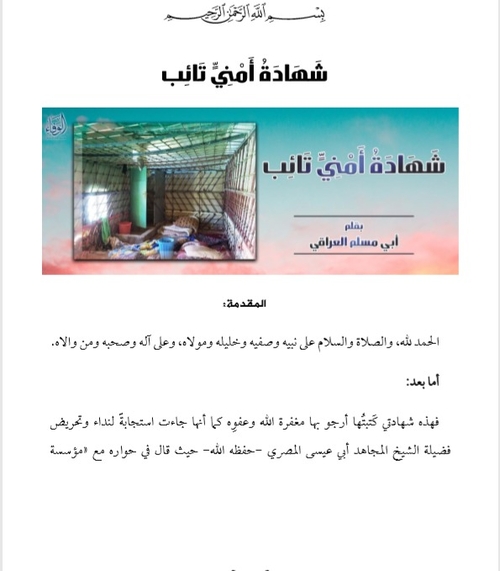
In the name of God, the Compassionate, the Merciful
Testimony of a repenting amni
By Abu Muslim al-Iraqi
Introduction
Praise be to God, and prayers and peace be upon His Prophet and his Safi and Khalil and Mawla, and on his family and companions and whoso is loyal to him.
As for what follows:
This is my testimony that I have written, through which I ask for God’s forgiveness and pardon as it has also come in response to the call and encouragement of his eminence the mujahid Sheikh Abu Eisa al-Masri (may God protect him) when he said in his discussion with Mu’assasat al-Turath al-Ilmi: “And I encourage all who have concealed truth about the Baghdadi regime to publish it, in advice to the Ummah and fulfilling one’s duty.”[i]
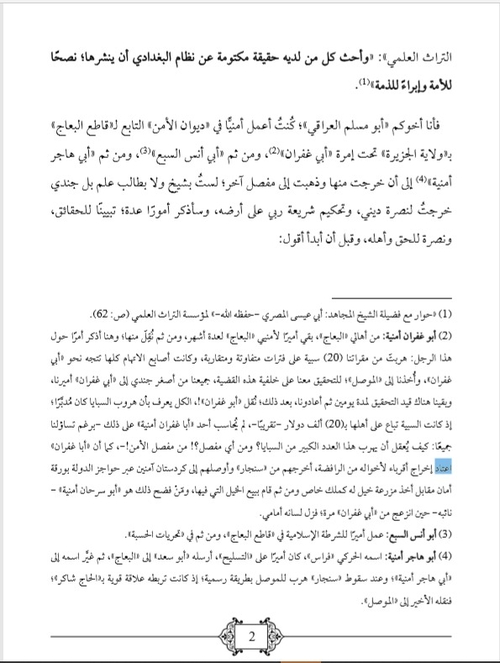
And I am your brother Abu Muslim al-Iraqi. I worked as an amni in the Diwan al-Amn affiliated with the al-Ba’aj sector in Wilayat al-Jazeera under the command of Abu Ghafran[ii] and then Abu Anas al-Saba’[iii] and then Abu Hajer Amniya,[iv] until I left it and went to another sector. I am not a sheikh or a student of ‘Ilm but rather a soldier who came out to support my religion and implement the ruling of the Shari’a of my Lord over His Earth. And I will mention multiple matters, making clear the facts, and in support of the truth and its people. And before I begin I say:
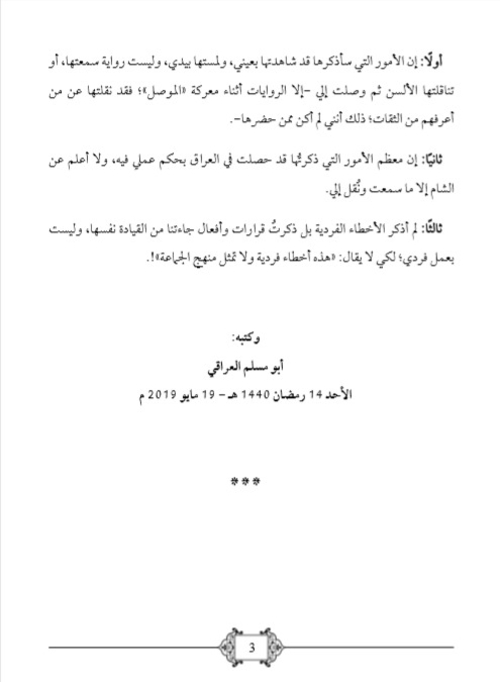
1. The matters I will mention, I witnessed them with my own eye, and touched them with my hand, and they are not a story I heard, or things transmitted by tongues that then came to me, except the stories during the battle of Mosul, for they were transmitted by those I know and trust. That is because I was not among those present at the battle.
2. Most of the matters I have mentioned happened in Iraq since I worked there, and I do not know about al-Sham except what I heard and was transmitted to me.
3. I have not mentioned individual mistakes but rather I have mentioned decisions and deeds that came to us from the leadership itself, and they are not individual deeds, so that it should not be said: “These are individual mistakes and do not represent the manhaj of the group!”
Written by Abu Muslim al-Iraqi
Sunday 14 Ramadan 1440 AH: 19 May 2019 CE

1. Breaking of pacts and covenants
The near and far and general mass of the Ummah before its mujahideen know that Ibn Awad gave a pact to every repenting apostate that he should be dealt with as the Muslims are dealt with, so he should have what they have, and upon him should be what is upon them, and no one should obstruct him even if he killed a million Muslims! And after some time, God granted for the conquest of the regions in Iraq, and the repentance of the apostates from the Ahl al-Sunna wa al-Jama’a was sought and after their repentance and the stabilization of the situation for the Dawla, the order came to us to arrest the officers who repented. And we arrested many of them, and many fled, and the arrested were made to go to Mosul before the judge Abu Hussein Dima’,[v] so he ordered to kill them and they were killed, and that was after their repentance. And God is witness to what I say. And let no one say: “This is an individual deed”! For the order to hand them over to the judge of the wilaya came from Abu Sa’ad al-Lahibi.[vi] And it is not an ijtihad by one of the members, and it was not concealed.
Basim Jihad al-Obaidi was an officer with the rank of captain in Sinjar, and after the conquest of Mosul,[vii] he returned to al-Ba’aj, after he heard of the acceptance of the repentance of the apostates in it, and when he arrived, I was among those supervising the interrogation with him and his repentance was sought. He was arrested months after that and he was transferred to Mosul and killed there.

And Mazhar Khabur al-Obeidi was a policeman in Mosul. After the conquest he fled to Arbil. Then he contacted our sector in order to announce his repentance. So he was given a pledge of its acceptance, so he trusted them, and when he came to Mosul, he was arrested and killed on the pretext that he had not repented, and his arrest was a little before he received the repentance card!
And then the second order came to arrest the repenting members of the ‘provincial councils’, and the one who was arrested in our sector as an example: Radif Hammad al-Affin,[viii] and this man was brought by his brother and handed over his by his hand, and I myself received that man from him, for he was reassured, that is that he came in repentance, and he took his sheep, and he settled in Jazeerat al-Ba’aj, and he had been removed from the council after his repentance on the accusation of being ‘Da’eshi’, and the separation decision came from the Ninawa Council of kufr, and the order for his removal is document, and was displayed on the al-Sharqiya channel. But he was executed after he was transferred to Mosul.
The order to execute them as general and not particular to individuals among them so that we can say: “They annulled their repentance and this is the reward of the one who annuls his repentance.” They said to us: “Every officer and council member present in the area must be arrested.” And no list of individuals came to us but rather we are the ones who gathered their names, and as a result of that we carried out the arrests, and had the order been particular for specific names, a list of them would have been sent to us.
And someone might say: “Perhaps they annulled the allegiance pledge…!” I say: these people were in the land of the Dawla, and they did not go out from it, and they carried the “repentance card”! This was so, aside from our confiscation of their property and cars after their repentance!
And likewise after the Dawla accepted the repentances of the apostates from the police, army and others, they were given the “repentance card” so that they would not face obstructions.

And some months after their repentance was sought, the Diwan al-Amn issued an order and statement for distribution to the sectors compelling every repenting person from the police only to hand over a Glock pistol as a fine- exclusively- and the one who did not have that should pay $2000 in compensation for it. The repenting people from the army were not included in this statement for distribution and decision, and the reason goes back to the fact that members of the police had received pistols as secondary weapons alongside Kalashnikov rifles, whereas the army personnel did not receive weapons. So we established checkpoints and began arresting the repenting people from the police and compelled them to undertake the fine, so some of them bought a pistol from dealers and brought them to us, and some of them paid us $2000, and whoso could not pay would be imprisoned until his family could bring the sum together and pay it to us.
And they would ask us on that day: “Why do you want weapons from us, when you know that most of us left the stations and bases and fled?!” We would say: “We have no relation with the orders that come to us, and it was said to us: ‘The condition of the truth of repentance is bringing these weapons.'”
Someone may say: “It is possible that among them are those who did not hand over their weapons or concealed them!”
I say:
1. I do not deny that some of them- after the conquest of Mosul- had hidden their weapons or sold them, and this, which was the case with some of them, was not the case with all of those asked to repent. So how can we distinguished?! Has this repenting person lost his weapons or sold them or hidden them or fled and abandoned them?! We compelled all without distinction to undertake the fine.
2. We interrogated them when they announced repentance, and we would ask them about their weapons, so whoso admitted that he had weapons brought them, and whoso said he had abandoned his weapons in the bases, we believed him and accepted his repentance.

So if the treacherous leadership would go back in its acceptance of their repentance like the one who vomits then eats his vomit, so did they accept their repentance in the first place?!
3. Some of the police personnel- at the time of the conquest of Mosul- were on leave permit: i.e. in their homes- and it was not allowed for them to take their weapons with them to their homes, except the officers. And we knew that, so by what right did the leadership deem their property permissible to seize after their repentance?
2. Giving security and pact to the Yezidis and their women if they converted to Islam: ‘The men should not be killed, and the women should not be taken as sabaya.’
The attack was carried out on the city of Sinjar and it was conquered[ix]– praise be to God- and the Yezidis were brought together and it was said to them: “All the men who convert to Islam will be spared from killing, and the women will spared from being taken captive as sabaya.” And the visual production was issued for that under the title of “Hundreds of the Yezidis enter into Islam.”[x]
And the one who gave them the pact is al-Hajj Abdullah,[xi] and he met them along with Abu Hamza al-Shari’i al-Hamdi[xii] after they brought together in the village of Kojo south of Sinjar. They were also given the help they needed from food, drink and other things, and they were taught Islam, prayers and the like, and after some time and the fleeing of most of the sabaya who were distributed after the increase of the prices for them, the need for them became pressing.

So Abu Ghafran and Abu Sarhan Amniya[xiii] came to us and by agreement with Abu Maryam al-Juburi[xiv] and by order of al-Hajj Mu’atazz al-Turkmani,[xv] a unit was set up and I was one of its members. And we went to the village of Kojo where there were the Yezidis who had converted to Islam, and we brought from them a family of 7 girls with their father and mother and brothers, and we said to them: “You are fine in your Islam, so the order has come to return you to your home in the village of Qabusiya.” So they were strongly joyful, and by the One who raised the sky without a pillar, when we took them to convey them to the village, their sons were in the mosque, and one of them came out to us with the Kitab al-Tawheed in his hand. And when we conveyed them to their old home in the village of Qabusiya, we took their daughters by force and they were distributed to the people of the agreement[xvi] who brought the order from al-Hajj Mu’atazz al-Turkmani. Months later, complaints against Abu Maryam al-Juburi reached the judiciary, so he and Abu A’isha al-Juburi[xvii] were taken to the court, and they were asked: “Why did you do what you did?!” They said: “By order of Hajji Mu’atazz al-Turkmani.” So they got them out of prison without reckoning, despite their admitting what their hands had committed. So whoso takes orders from the “deputies of Ibn Awad” will necessarily be above reckoning.
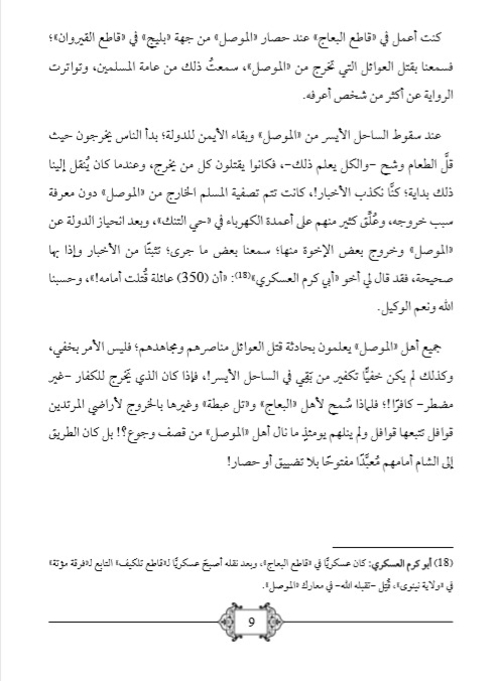
3. Targeting the Muslims and killing them when they were going out of Mosul
I was working in the al-Ba’aj sector when Mosul was besieged from the side of Balij in the al-Qayrwan sector, so we heard of the killing of families that were going out from Mosul. I heard that from the Muslim masses, and the story was corroborated by more than one person I know.
When the left bank of Mosul fell and the right remained for the Dawla, the people began going out as food was in short and scarce supply- and all knew that- so they would kill all who were going out, and when that was transmitted to us at first, we deemed the news a lie1 The Muslim leaving Mosul was being liquidated without knowing the reason he left, and any of them were handed on electricity poles in the al-Tanak neighbourhood. And after the Dawla retreated from Mosul and some of the brothers left it, we heard some of what had happened, trying to be sure of the news and whether it was true. The brother Abu Karam al-Askari[xviii] said to us that “350 families were killed” in front of him! And God is our reliance and He suffices as trustee.
All the people of Mosul know of the incident of killing of the families: their munasir and their mujahid. So the matter is not hidden. And likewise the takfir of the one who remained on the left bank was not hidden! So if the one who went out to the disbelievers- uncompelled- is a disbeliever, why was it allowed for the people of al-Ba’aj and Tel Abtah and others besides them to go out to the lands of the apostates caravans after caravans and there did not befall them what befell the people of Mosul from bombing and hunger? Indeed the path to al-Sham before them was made passable for traffic and open without narrowing or siege.
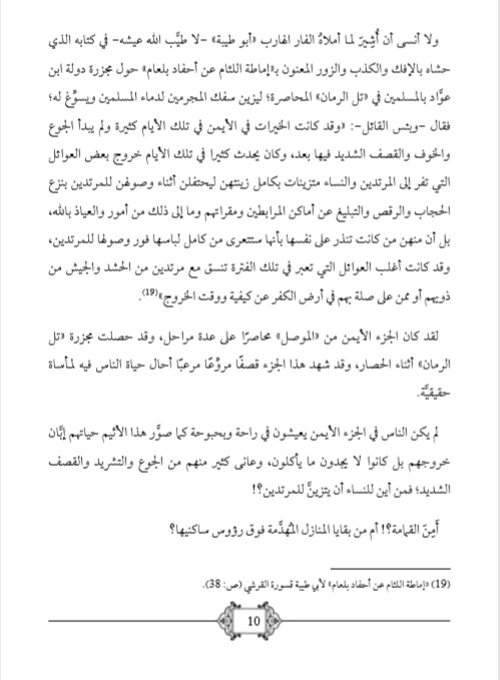
And I should not forget to point out what the fleeing scoundrel Abu Tayyiba- may God not make his life good- wrote in his book that he filled with falsehood, lies and fabrication- entitled “Imatat al-Litham ‘an Ahfad Bal’am”- concerning the massacre of the Dawla of Ibn Awad against the Muslims in the besieged Tel al-Raman, in order to sugarcoat the criminals’ spilling of the Muslims’ blood and justify it as permissible. For he said- and wretched is the one who says it: “And the good things in the right bank in those days were many and hunger and fear and intense bombing had not yet begun in it, and there was occurring a lot in those days the going out of some of the families who were fleeing to the apostates and the women were completely adorned in their adornment in order to celebrate during their arrival to the apostates with the removal of the hijab and dancing and informing about the places of the murabiteen and their bases and the like from matters and refuge is to be sought in God. Indeed among them were those who swore upon themselves to be rid of the entirety of their clothing as soon as they reached the apostates. And most of the families who crossed over in that time were coordinating with apostates from the Hashd and army from their relatives or those who had a link with them in the land of kufr as to how and when they should go out.”[xix]
The right part of Mosul was besieged over a number of stages, and the massacre of Tel al-Raman occurred during the siege, and this part witnessed terrible dreadful bombing that brought the life of the people in it to a true tragedy.
The people in the right part were not living in comfort and ease as this evil man has portrayed their life when they left. But rather they did not find what they could eat, and many of them suffered from hunger, displacement and intense bombing. So from where could the women adorn themselves for the apostates?!
From the garbage? Or from the remains of the homes destroyed above the heads of their inhabitants?
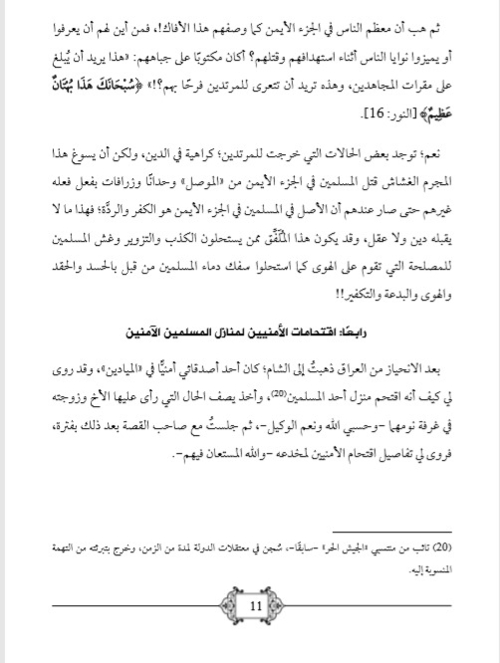
Then suppose that most of the people in the right part are as this liar described them! From where do they get to know or distinguish the intentions of the people when they are targeted and killed? Was it written on their foreheads: “This man wants to inform on the bases of the mujahideen, and this woman wants to undress herself to the apostates out of joy for them?!” Exalted are You: this is a great slander (al-Nur 16).
Yes, there are some cases of people who went out to the apostates out of hatred towards the religion, but for this deceptive criminal to justify the killing of the Muslims in the right part of Mosul as individuals and groups by the deed of others such that it has arisen among them that the principle for the Muslims on the right side is kufr and apostasy; this cannot be accepted in religion or reason. And this fabrication may be of those who deem permissible lying and fabrication and swindling of the Muslims for the interest that arises on arbitrary whims just as they deemed permissible shedding of the blood of the Muslims previously by envy, hatred, arbitrary whims, innovation and takfir!!
4. Assaults by amnis on the houses of the Muslims in peace and security
After the withdrawal from Iraq I went to al-Sham. One of my brothers was an amni in al-Mayadeen, and he told me how he assaulted the home of one of the Muslims,[xx] and he began describing the state upon which he saw the brother and his in their bedroom- and God is my reliance and He suffices as trustee- then I sat with the protagonist of the story a while after that so he narrated to me details of the assault of the amnis on his chamber. And God is the One whose help is to be sought against them.

Finally: I ask God Almighty to forgive me, accept my repentance and pardon me. And upon God is the intention of the path, and He is my reliance and Lord and He suffices as trustee.
“The Day God will resurrect all of them and inform them of what they have done. God will count it even as they have forgotten it. And God is witness to everything” (al-Mujadala 6).
1440 AH/2019 CE


